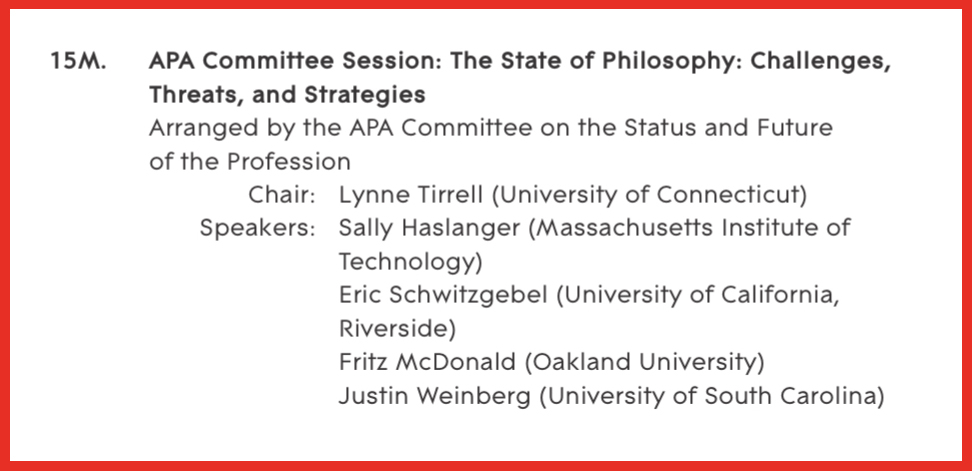“State of Philosophy: Challenges, Threats, and Strategies” Session at the APA
The Eastern Division Meeting of the American Philosophical Association (APA) is taking place this week in New York.
The full program is here.
If you’re at the conference and are interested in issues confronting the profession, I encourage you to attend the session, “State of Philosophy: Challenges, Threats, and Strategies,” taking place Thursday morning at 9am.
The session features Sally Haslanger (MIT), Eric Schwitzgebel (UC Riverside), Fritz McDonald (Oakland), and me.

Come by, join the discussion, and say hi.
If you can’t make it, feel free to suggest topics for discussion in the comments here, and maybe we will get to them.


Glad to see philosophers are talking about this.
We should also be worried about the cratering of public confidence in academia more generally. Josh Barro put it well in The Atlantic (also here) when he said he wants to see the education industry
folks better start getting organized as faculty unions worth the name (as in prepared for general strikes) or pack yer bags….
In 2010 I literally had my union card ready to send in my hand when I found out that Act 10 was passed in Wisconsin that banned UW unionization. When states go enough red, unions are dead. Politics cannot be divorced from this conversation.
yes I’m stuck in Iowa but sometimes civil disobedience is called for
FYI
Unionized faculty in the SUNY system cannot go on strike. The law prevents it. So though our union is quite effective, not all unions are the same. But the system would be far worse without the union.
yes I’m stuck in Iowa but sometimes civil disobedience is called for so of course you can go on strike if you choose to
Yes, of course you can. But as a foreigner, I would be reluctant to. I can also be deported.
If you are interested in a different sort of challenge to professional philosophy than the other comments above have inferred from the title of this session, a challenge to philosophy from marginalized philosophers, you might be interested in the presentation that I gave yesterday in the invited symposium “Philosophy of Disability,” a session on my work in philosophy of disability. My presentation is entitled “Philosophy of Disability: Its Purposes and Places.” You will find the text of the presentation at BIOPOLITICAL PHILOSOPHY here: Philosophy of Disability: Its Purposes and Places. Presentation to the Eastern APA, January 16, 2024 – BIOPOLITICAL PHILOSOPHY
In the coming days, I will post (at BIOPOLITICAL PHILOSOPHY) the commentary on my presentation that Julie Maybee gave in the symposium.
That sounds really interesting Shelley. What other topics were covered at the APA session?
Hi Kaila, thanks very much for your interest! The symposium was a session on my work, so the commentaries drew upon my presentation, the work that I have done on philosophy of disability, Foucault, biopolitics, etc. and tied it to elements of the respective commenters’ own work.
So, Julie Maybee focused on (among other things) my claims about the distinction between philosophy *of* disability and work on philosophy *and* disability, using Hegel (one of her specializations) to elaborate the distinction. She also focused on my critique of the British social model of disability and development of a historicist and relativist conception of disability, talking about its influence for her own work to develop a historicist and relativist account of disability.
Catherine Clune-Taylor talked about my claims with respect to bioethics as eugenics, analogized the distinction between bioethics and philosophy of disability, as well as abolition of bioethics, to the distinction between trans feminism/transfeminist philosophy and so-called gender critical feminism. Catherine also talked about philosophy as a discipline, what it does, its aims, and its purposes.
It was a great session.
As I said in my initial comment, I will likely post Julie’s commentary to BIOPOLITICAL PHILOSOPHY soon. I think she wants to add some references before I do so.
I see, thanks Shelley. I wish I could have been there. look forward to reading the commentary.
Will there be any summary or discussion as to what was said at this session? I bet I’m not alone in being interested.
I’ll be posting about my remarks later today or tomorrow.
Looking forward to it.